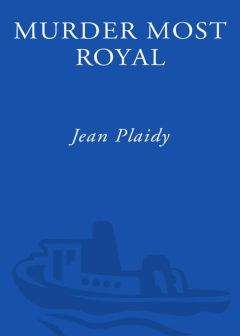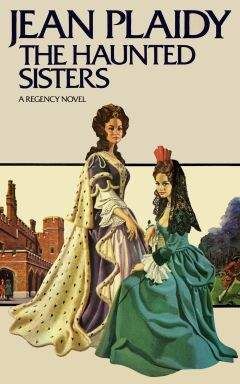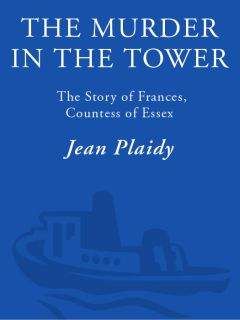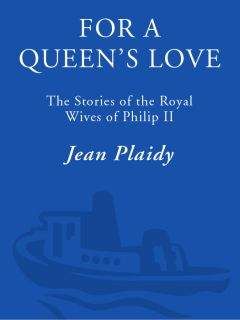Jean Plaidy - Murder Most Royal: The Story of Anne Boleyn and Catherine Howard
На сайте mybooks.club вы можете бесплатно читать книги онлайн без регистрации, включая Jean Plaidy - Murder Most Royal: The Story of Anne Boleyn and Catherine Howard. Жанр: Прочее издательство неизвестно,. Доступна полная версия книги с кратким содержанием для предварительного ознакомления, аннотацией (предисловием), рецензиями от других читателей и их экспертным мнением.
Кроме того, на сайте mybooks.club вы найдете множество новинок, которые стоит прочитать.

Jean Plaidy - Murder Most Royal: The Story of Anne Boleyn and Catherine Howard краткое содержание
Murder Most Royal: The Story of Anne Boleyn and Catherine Howard читать онлайн бесплатно
“Give it back!” she demanded.
“Not I! I shall keep it forever, and when I feel most melancholy I shall take it out and look at it, and remember that on the afternoon I stole it you all but said you loved me.”
“This is foolishness,” she said. “I do not wish to lose that tablet.”
“Alas then, Anne! For lost it you have. It is a pleasing trinket—it fills me with hope. When I feel most sad I shall look at it, for then I shall tell myself I have something to live for.”
“Thomas, I beg of you...”
She would have snatched it, but he had stepped backwards and now was laughing.
“Never will I give it up, Anne. You would have to steal it back.”
She moved towards him. He ran, she after him; and running across the enclosed pond garden, trying to retrieve that which he had stolen, was poignantly reminiscent of happy childhood days at Allington and Hever.
The Cardinal rode through the crowds, passing ceremoniously over London Bridge and out of the capital on his way to France, whither he had been bidden to go by the King. Great numbers of his attendants went before him and followed after him; there were gentlemen in black velvet with gold chains about their necks, and with them their servants in their tawny livery. The Cardinal himself rode on a mule whose trappings were of crimson velvet, and his stirrups were of copper and gold. Before him were borne his two crosses of silver, two pillars of silver, the Great Seal of England, his Cardinal’s hat.
The people regarded him sullenly, for it was now whispered, even beyond the court, of that which had come to be known as the King’s Secret Matter; and the people blamed the Cardinal, whispering that he had put these ideas into the King’s head. Whither went he now, but to France? Mayhap he would find a new wife to replace the King’s lawful one, their own beloved Queen Katharine. They found new loyalty towards their quiet Queen, for they pictured her as a poor, wronged woman, and the London crowd was a sentimental crowd ever ready to support the wronged.
In the crowd was whispered the little ditty which malicious Skelton had written, and which the public had taken up, liking its simple implication, liking its cutting allusions to a Cardinal who kept state like a king.
“Why come ye not to court?
To which court?
To the King’s court
Or to Hampton Court!”
He was well hated, as only the successful man can be hated by the unsuccessful. That he had risen from humble circumstances made the hatred stronger. “We are as good as this man!” “With his luck, there might I have gone!” So whispered the people, and the Cardinal knew of their whisperings and was grieved; for indeed many things grieved this man as he passed through London on his way to Sir Richard Wiltshire’s house in Dartford wherein he would spend the first night of his journey to the coast.
The Cardinal was brooding on the secret matter of the King’s. It was for him to smooth the way for his master, to get him what he desired at the earliest possible moment; and he who had piloted his state ship past many dangerous rocks was now dismayed. Well he could agree with His Majesty that the marriages of kings and queens depend for their success on the male issue, and what had his King and Queen to show for years of marriage but one daughter! The Cardinal’s true religion was statecraft; thus most frequently he chose to forget that as Cardinal he owed allegiance to the Church. When he had first been aware of the King’s passion for Mistress Anne Boleyn, many fetes had he given at his great houses, that the King and this lady might meet. Adultery was a sin in the eyes of Holy Church; not so in the liberal mind of Thomas Wolsey. The adultery of the King was as necessary as the jousts and tourneys he himself arranged for His Majesty’s diversion. And though he was ever ready to give the King opportunities for meeting this lady, he gave but slight thought to the amorous adventures of His Majesty. This affair seemed to him but one of many; to absorb, to offer satiety; that was inevitable. And then...the next. So when this idea of divorce had been passed to him by the King, glorious possibilities of advancing England’s interests through an advantageous marriage began to take hold of the Cardinal’s mind.
Should England decide to ally herself with France against the Emperor Charles, what better foundation for such an alliance could there be than marriage! Already he had put out feelers for Francis’s widowed sister, Marguerite of Alencon, but her brother, uncertain of Henry who still had an undivorced wife—and she none other than the aunt of the Emperor Charles himself—had dallied over negotiations, and married his sister to the King of Navarre. There was, however, Renee of France, sister to the late Queen Claude, and Wolsey’s heart glowed at the prospect of such a marriage. Had not Claude borne Francis many children? Why, therefore, should Renee not bear Henry many sons? And to make the bargain complete, why not contract the King’s daughter Mary to Francis’s son, the Duke of Orleans? Of these matters had Wolsey spoken to the King, and craftily the King appeared to consider them, and whilst considering them he was thinking of none but Anne Boleyn, so did he yearn towards her; and so had her reluctance inflamed his passion that already he was toying with the idea of throwing away Wolsey’s plans for a marriage which would be good for England; he was planning to defy his subjects’ disapproval, to throw tradition to the wind, to satisfy his desires only and marry Anne Boleyn. He knew his Chancellor; wily, crafty, diplomatic; let Wolsey consider this divorce to be a state affair, and all his genius for statecraft would go into bringing it about; let him think it was but to satisfy his master’s overwhelming desire for a humble gentlewoman of his court—who persistently and obstinately refused to become his mistress—and could Wolsey’s genius then be counted on to work as well? The King thought not; so he listened to Wolsey’s plans with feigned interest and approval, but unknown to the Cardinal, he dispatched his own secretary as messenger to the Pope, for he wished to appease his conscience regarding a certain matter which worried him a little. This was his love affair with Mary Boleyn, which he feared must create an affinity between himself and Anne, though he had determined it should be of small consequence should his secretary fail to obtain the Pope’s consent to remove the impediment.
Riding on to Dartford, the Cardinal was busily thinking. There was within him a deep apprehension, for he was aware that this matter of the divorce was to be a delicate one and one less suited to his genius, which loved best to involve itself in the intricacies of diplomacy and was perhaps less qualified to deal with petty domesticities. Of Anne Boleyn he thought little. To him the King’s affair with this foolish girl was a matter quite separate from the divorce, and unworthy of much thought. It appeared to him that Anne was a light o’ love, a younger version of her sister Mary, a comely creature much prone to giving herself airs. He smiled on her, for, while not attaching over-much importance to the King’s favorites whose influence had ever been transient, it was well not to anger them. Vaguely he remembered some affair with Percy; the Cardinal smiled faintly at that. Could it be then that the King had remained faithful so long?
He fixed his eyes on his Cardinal’s hat being borne before him, and that symbol of his power, the Great Seal of England; and his mind was busy and much disturbed, recent events having complicated the matter of divorce. He thought of the three men of consequence in Europe—Henry, Charles and Francis. Francis—even enfeebled as he was just now—had the enviable role of looker-on, sly and secret, waiting to see advantage and leap on it; Henry and Charles must take more active parts in the drama, for Henry’s wife was Charles’s aunt, and it was unlikely that Charles would stand calmly by to see Henry humiliate Spain through such a near relation. Between these two the Pope, a vacillating man, was most sorely perplexed; he dared not offend Henry; he dared not offend Charles. He had granted a divorce to Henry’s sister Margaret on the flimsiest of grounds, but that had proved simple; there was no mighty potentate to be offended by such a divorce. Henry, ranting, fuming, urgently wanting what, it seemed to him, others conspired to keep from him, was a dangerous man; and to whom should he look to gratify his whims but Wolsey? And on whom would he vent his wrath, were his desires frustrated?
This sorry situation had been vastly aggravated by a recent event in Europe; the most unexpected, horrible and sacriligious event the Cardinal could conceive, and the most disastrous to the divorce. This was the sack of Rome by the Duke of Bourbon’s forces in the name of the Empire.
Over the last few years Wolsey had juggled dexterously in Europe; and now, riding on to Dartford, he must wonder whether out of his cunning had not grown this most difficult situation. For long Wolsey had known of the discord which existed between Francis and one of the most powerful nobles of France, the mighty Duke of Bourbon. This nobleman, to safeguard his life, had fled his country, and being a very proud and high-spirited gentleman was little inclined to rest in exile all his life; indeed for years before his flight he had been in treasonable communication with the Emperor Charles, France’s hereditary enemy, and when he left his country he went to Charles with plans for making war on the French King.
Now it had occurred to Wolsey that if the Duke could be supplied secretly with money he could raise an army from his numerous supporters and thus be, as it were, a general under the King of England while none need know that the King of England had a hand in this war. Therefore would England be in secret alliance with Spain against France. Henry had felt the conception of such an idea to be sheer genius, for the weakening of France and the reconquering of that country had ever been a dream of his. A secret ambassador had been sent to Emperor Charles, and the King and Wolsey with their council laughed complacently at their own astuteness. Francis, however, discovered this and sent a secret messenger to make terms with England, with the result that Bourbon’s small army—desperate and exhausted—awaited in vain the promised help from England. Wolsey had calculated without the daring of the Duke and the laxity of the French forces, without Francis’s poor generalship which alternately hesitated and then was overbold. At Pavia the French King’s forces were beaten, and the King taken prisoner; and among his documents was found the secret treaty under the Great Seal of England. Thus was Francis a prisoner in the hands of the Emperor, and thus was English double-dealing exposed. Francis was to languish and come near to death in a Madrid prison; and Charles would not be overeager to link himself with England again. So that the master-stroke which was to have put England in the enviable position of being on the winning side—whichever it was to be—had failed.
That had happened two years ago; yet it was still unpleasant to contemplate, as was Wolsey’s failure, in spite of bribery, to be elected Pope. And now had come the greatest blow; Bourbon had turned his attentions to the city of Rome itself. True, this had cost the hasty Duke his life, but his men went on with his devilish scheme, and the city was ransacked, laid waste by fire and pillage, its priests desecrated, its virgins raped; and the sacred city was the scene of one of the most terrible massacres in history. But most shocking of all was, the fact that the Pope, who was to grant Henry’s divorce, was a prisoner at Castle Angell—prisoner of the Emperor Charles, the nephew of that lady who was to be most deeply wronged by the divorce.
Small wonder that the Cardinal’s head ached, but even as it ached it buzzed with plans, for it had ever been this man’s genius to turn every position in which he found himself to his own advantage; and now an idea had come to him that should make him more famous, make his master love him more. A short while ago it had seemed to him that a vast cloud was beginning to veil the sun of his glory, as yet so vaporish that the sun was but slightly obscured and blazed hotly through. He trusted in the sun’s fierce rays to disperse that cloud; and so it should be. The Pope was a prisoner; why not set up a Deputy-Pope while he was thus imprisoned? And who more fitted for the office than Cardinal Wolsey? And would not such a deputy feel kindly disposed towards his master’s plea for a divorce?
On rode the Cardinal, renewed and refreshed, until he came to Canterbury; and there he was the leader of a mighty procession that went into the Abbey; and, gorgeously attired, wearing his Cardinal’s hat, he prayed for the captive Pope and wept for him, while his mind was busy with the plans for reigning in Clement’s stead, granting the divorce, and marrying his master to a French princess.
And so passed the Cardinal on to France where he was received royally by the Regent, Louise of Savoy—who reigned during the absence of her son Francois—and by the King’s gifted sister, Marguerite of Navarre. He assured them of his master’s friendship with their country; he arranged the marriage of the King’s daughter to the Duke of Orleans; and he hinted at the King’s divorce and his marriage with Renee. He was entertained lavishly, well assured of French friendship.
But among the people of France the Cardinal was no more popular than he was in England; and although he came with offers of friendship, and though he brought English gold with him, the humble people of France did not trust him and made his journey through their land an uncomfortable one. He was robbed in many places where he rested, and one morning when he arose from his bed, he went to his window and there saw that on the leaning stone some mischievous person had engraved a Cardinal’s hat, and over it a gallows.
The whole court whispered of nothing else but the King’s Secret Matter. Anne heard it; Katharine heard it. The Queen was afraid. Great pains she took with her toilet, hoping thereby to please the King, that there might yet be a hope of defying the doctors and producing an heir. Katharine was melancholy; she prayed more fervently; she fretted.
Anne heard it and was sorry for the Queen, for though she was as different from Anne as one woman could be from another, a gloomy woman, rarely heard to laugh, yet had Anne a deep respect for such piety as her mistress’s while feeling herself unable to emulate it.
But Anne was busy with thoughts of her own affairs. Wyatt was plaguing her, making wild and impossible suggestions; and she feared she thought too much and too often of Wyatt. There came to her little scraps of paper with his handwriting, and in the poems inscribed on these he expressed his passion for her, the unhappiness of his marriage, the hope he might have, would she but give it, of the future. There had been those who had said that Anne was half French; in character this was so. She was frivolous, sentimental, excessively fond of admiration; but mingling with these attributes was something essentially practical. Had Wyatt been unmarried, ready would she have been to listen to him; and now, admitting this to herself—at the same time giving him no hope that his plans would ever reach fruition—she found it impossible to refuse his attentions entirely. She looked for him; she was ever ready to dally with him. With her cousin, Surrey, and her brother to ensure the proprieties, she was often to be found with Wyatt. They were the gayest and most brilliant quartet at the court; their cousinship was a bond between them. Life was pleasant for Anne with such friends as these, and she was enjoying it as a butterfly flutters in the sunshine even when the first cool of evening is setting in.
Похожие книги на "Murder Most Royal: The Story of Anne Boleyn and Catherine Howard", Jean Plaidy
Jean Plaidy читать все книги автора по порядку
Jean Plaidy - все книги автора в одном месте читать по порядку полные версии на сайте онлайн библиотеки mybooks.club.




